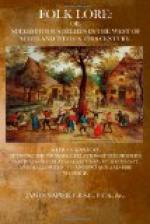In a general chapter, such as this, I can find room for some things which could not properly find a place in other chapters. The subject of omens has by no means been exhausted. The late George Smith, in his work upon the Chaldean Account of Genesis, says that in ancient Babylonia, 1600 B.C., everything in nature was supposed to portend some coming event. Without much exaggeration, the same might be said of the people of this country during the earlier part of this century.
On seeing the first plough in the season, it was lucky if it were seen coming towards the observer, and he or she, in whatever undertaking then engaged, might be certain of success in it; but, if seen going from the observer, the omen was reversed.
If a farmer’s cows became restive without any apparent cause, it foreboded trouble to either master or mistress.
On going on any business, if the first person met with was plain-soled, the journey might be given up, for, if proceeded with, the business to be transacted would prove a failure; but, by turning and entering the house again, with the right foot first, and then partaking of food before resuming the journey, it might be undertaken without misgiving.
It was unlucky to walk under a ladder set up against a wall, but if passing under it could not be avoided, then, if before doing so, you wished for anything, your wish would be fulfilled.
It was unlucky to eat twin nuts found in one shell.
If the eye or nose itched, it was a sign that the person so affected would be vexed in some way that day. If the foot itched, it was a sign that the owner of the foot was about to undertake a strange journey. If the elbow itched, it betokened the coming of a strange bedfellow. If the right hand itched, it signified that money would shortly be received by it; and, if the left hand itched, that money would shortly have to be paid away.
If the ear tingled, it was a sign that some one was speaking of the person so affected. If it were the right ear which did so, then the speech was favourable; if the left ear, the reverse. In this latter case, if the persons whose ears tingled were to bite their little fingers, this would cause the persons speaking evil of them to bite their tongues.
To break a looking-glass, hanging against a wall, was a sign that death would shortly occur in the family.
If a daughter’s petticoat was longer than her frock, it shewed that her father loved her better than her mother did.
If you desired luck with any article of dress, it should be worn first at church.
If a person unwittingly put on an article of dress outside in, it was an omen that he or she would succeed in what they undertook that day; but it was requisite that this portion of dress should remain with the wrong side out until night, for, if reversed earlier, the luck was reversed also.
To weigh children was considered an objectionable practice, as it was believed to injure their health, and cause them to grow up weakly.




